California
Scripps Translational Science Institute
La Jolla, California
Principal Investigator
Eric J. Topol, M.D., Scripps Research Institute
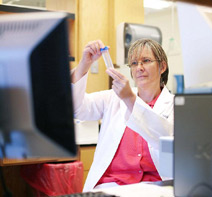
Kelly Frazer, Ph.D., director of genomics research at Scripps Translational Science Institute in San Diego, is working on an integrated Omics Program that studies the intersection of genomics, proteomics and glycomics and their influence on disease. She is researching how a piece of chromosome 9 (called 9p21) contributes to heart disease.
The Scripps Translational Science Institute (STSI) will emphasize three dimensions of translation: traditional bench-to-bedside, bedside-to-bench and back to bedside, and bedside to the community and practice of medicine. The vision of this program provides the appropriate amalgam of integration and innovation, and it capitalizes on particular strengths at The Scripps Research Institute, Scripps Health and partnering institutions as well as strengths of faculty members that have led to the development of the goals of STSI.
Building upon and establishing specific collaborations with leading translational science and clinical investigators will accelerate discovery that has impact across multiple research disciplines. Collaborations with a large subset of the 550 life science companies in San Diego provide an extraordinary advantage for accessing innovative technology and catalyzing benefits to patients. STSI exploits the excitement of today's scientific advances to speed tomorrow's preventions, improve health and train future leaders of academic medicine.
Spectrum: The Stanford Center for Clinical and Translational Education and Research
Palo Alto, California
Principal Investigator
Harry B. Greenberg, M.D., Stanford University
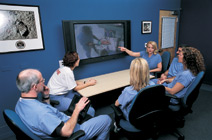
A team reviews tape of a simulated birth at the Center for Pediatric Education at Lucile Packard Children's Hospital. The facility is the world's first dedicated pediatric and obstetric medical simulation center, allowing health-care professionals to hone their skills in a simulated medical environment. The hospital is a participating institution in the Stanford Center for Clinical and Translational Education and Research. (Lucile Packard Children's Hospital Photo)
Spectrum: The Stanford Center for Clinical and Translational Education and Research will pursue a multidisciplinary approach to transform and integrate critical components of clinical and translational research related to human health across Stanford University's academic and clinical enterprise. The goals of the center are to effectively convert basic discoveries into practical methods that will improve human health and to prepare the next generation of research leaders to ensure that the translation of discoveries into benefits for human health continues into the future. This mission will be accomplished through a series of coordinated and synergistic transformative changes in their educational and mentoring programs, institutional governance structure, research support infrastructure, and the professoriate, which are all intended to promote clinical and translational research at Stanford and in the community.
The vision for the Stanford center is to transform the goals of the institution to incorporate the needs and priorities of the local community while continuing to promote research. To realize this vision, Stanford is creating an Office of Community Research to create and establish bidirectional information flow between the community and investigators, making the community a true partner in setting the research agenda and priorities. The Office of Community Research will serve as a single point of contact for community groups and Stanford investigators, with the goals that include enhancing understanding of local community needs and priorities and improving dissemination of key research results to the local community to promote health and improved clinical practice.
UCLA Clinical and Translational Science Institute
Los Angeles, California
Principal Investigator
Steven M. Dubinett, M.D., University of California Los Angeles

Pediatric research is an essential aspect of the UCLA Clinical and Translational Science Institute. Melinda Braskett is a pediatric and adult allergist who conducts research in the Food and Allergy Care Center. (UCLA Photo)
The UCLA Clinical and Translational Science Institute (CTSI) is an academic-clinical-community partnership designed to accelerate scientific discoveries and clinical breakthroughs for improved health. The cultural and economic diversity of Los Angeles County poses challenges for health and disease research. The CTSI is creating transdisciplinary teams focused on these challenges and community health needs.
The CTSI mission is to create a borderless clinical and translational research institute that brings UCLA innovations and resources to bear on the health needs of Los Angeles. To accomplish its mission CTSI has established five goals: 1) create an academic home for clinical and translational science that integrates the many strengths of UCLA and its partners; 2) build transdisciplinary research teams to translate discoveries for improved health; 3) transform educational and career development programs to promote the next generation of clinician investigators and translational scientists; 4) expand strong bidirectional academic-community partnerships to ensure that new scientific discovery is relevant to community needs; and 5) serve as a national resource for collaborative research through regional, statewide and national CTSA consortia.
CTSI will reach underrepresented populations and develop translational strategies for health improvements nationwide.
UC Davis Clinical and Translational Science Center
Sacramento, California
Principal Investigator
Lars Berglund, M.D., Ph.D., University of California, Davis
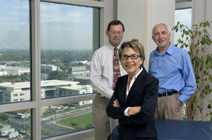
A cadre of leading scientists and physicians will be overseeing the new UC Davis Clinical and Translational Science Center. A few program leaders include: Ann Bonham, Ph.D., executive associate dean for research and education; Lars Berglund, M.D., Ph.D., assistant dean of clinical research and director of the new center; and Fitz-Roy Curry, associate dean for research.
The University of California, Davis (UC Davis) is proposing to create a Clinical and Translational Science Center (CTSC) that will transform its medical research enterprise into a highly effective open academic home for clinical and translational research by building on three key assets: 1) a long-standing commitment as a land-grant university to serve the geographically dispersed and ethnically diverse populations of inland and northern California with a health care system enabled by one of the broadest and most extensive telecommunications programs in the world; 2) the collaborative culture of UC Davis, which has one of the most extensive and interdisciplinary life science environments in the country; and 3) an established CTSC pilot facility — the UC Davis Clinical Research Investigator Services Program (CRISP) — that serves as the physical home for clinical and translational research, and for faculty training and career development. CRISP is a fundamentally important CTSC testing ground where many perceived CTSC barriers have been explored and solutions have been tested. Through CRISP, UC Davis has completed the planning phase for CTSC.
In the structure of CTSC, considerable attention is paid to create an organization that is: 1) responsive and familiar to investigators; 2) flexible; 3) well linked to university leadership, participating academic units and the community; and 4) focused on the goal of reducing barriers and facilitating the translation of research gains into medical practice. Key features are an education program focused on team science, extensive collaborations across UC Davis colleges and centers, introduction of catalyst functions such as collaborative research facilitators and translational postdoctoral fellowships, dissemination through teletechnology, flexible use of resources for patient-oriented research, and a community engagement program emphasizing trust and respect.
CTSC is under the leadership of two co-principal investigators, Drs. Berglund M.D., Ph.D., and Joseph M.D., Ph.D., supported by a team of directors and co-directors that oversees each of the nine CTSC programs, and a comprehensive committee structure, designed to firmly anchor the CTSC with institutional leadership, faculty, trainees and the community. CTSC will be implemented through a carefully designed collaborative plan, and the activity will be guided through continuous evaluations and corrections.
University of California, Irvine Institute for Clinical and Translational Science
Irvine, California
Principal Investigator
Dan M. Cooper, M.D., University of California, Irvine
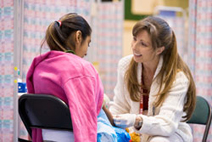
ICTS is dedicated to innovation in clinical science. In this photograph, ICTS Research Nurse Connie Parido is drawing blood in a regional middle school as part of an NIH-funded research effort to reduce obesity in children at high-risk for developing type 2 diabetes. (Paul R. Kennedy Photo)
The University of California, Irvine (UCI) Institute for Clinical and Translational Science (ICTS) is designed to identify, test and implement innovative ways to break down barriers that impede biomedical discovery. The overarching vision of ICTS is to: 1) Nurture novel collaborations by building multidisciplinary research teams, such as chemists and clinicians exploring breath biomarkers in the human “ventilome.” ICTS experts in team science will work with investigators to identify and remove obstacles to successful collaboration. 2) Create new research tools by assessing new technologies for clinical investigators including iophotonics and microdevices, ubiquitous computing for field research, approaches for qualitative and comparative-effectiveness research, and metrics of human performance that link genomic information with dynamic disease phenotypes. 3) Share information by bringing together clinicians, hospital information technology staff and UCI scholars in the Center for Biomedical Informatics. Infrastructure for clinical data interoperability is embedded in the data warehouse. 4) Engage our community by championing new approaches such as PEER (Participant Experience Enhancement in Research), a program that views research volunteers as partners in the process of discovery. Research outreach and dissemination activities are targeted to a variety of timely health care issues, such as mitigating elder abuse and preventing sudden death in pediatric athletes. 5) Training clinical and translational researchers by sponsoring Crossing Boundaries, a set of degree and certificate programs along with mentorship interaction that tackles key issues in translational science.
Finally, UCI is working with regional academic centers to actualize the CTSA vision of collaborative translational science throughout Southern California.
UC San Diego Clinical Translational Research Institute
La Jolla, California
Principal Investigator
Gary Steven Firestein, M.D., University of California, San Diego
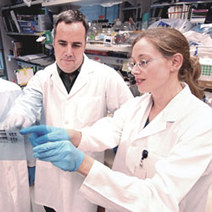
Victor Nizet, M.D., chief of the division of pediatric pharmacy and drug discovery at the UCSD School of Medicine department of pediatrics and Skaggs School of Pharmacy and Pharmaceutical Sciences, analyzes a gel related to a novel target for treatment of MRSA and anthrax infections with post-doctoral fellow Shauna McGillivray. (UCSD Photo)
The goals of the University of California, San Diego (UCSD) Clinical and Translational Research Institute (CTRI) are to: 1) provide an academic home for the discipline of clinical and translational science; 2) establish an integrated educational pipeline to train and support clinical and translational scientists; 3) develop a robust clinical research infrastructure that replaces silos with integrated research; 4) enhance bioinformatics capabilities that leverage unique UCSD resources; 5) develop novel technologies to improve research, such as biomarker and imaging; 6) form a Translational Research Alliance with research institutes and industry; and 7) form a Community Alliance with community physicians and the general public to translate scientific discoveries into best practices, increase research into health care disparities and involve the general public in biomedical science.
CTRI will transform education in clinical and translational science by coordinating disparate programs, providing breadth of education from high school through predoctoral students, and providing training to postdoctoral fellows and faculty. The institute also will transform the conduct of clinical research by providing guidance and support from initial planning through data analysis and sharing. The new structure will foster development of novel technologies to facilitate clinical research and provide support for the services and resources necessary to conduct clinical investigation and improve health. CTRI will place a special emphasis on several areas of strength, such as imaging, biomarkers, community outreach and the translation of basic science discoveries to clinical science.
UCSF Clinical and Translational Science Institute
San Francisco, California
Principal Investigator
S. Clay Johnston, M.D., Ph.D., University of California, San Francisco
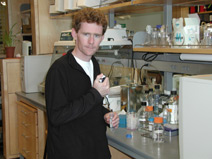
Joseph DeRisi, Ph.D., in his lab at the University of California, San Francisco. (UCSF Photo/Felix Aburto)
Despite explosive gains in our understanding of the basic mechanisms of human disease, meaningful translation of this knowledge to the treatment and prevention of disease has moved slowly. To accelerate the pace at which discoveries in basic science can serve the health of our patients and community, the University of California, San Francisco (UCSF) intends to establish a Clinical and Translational Science Institute (CTSI). Its mission will be to create a comprehensive, integrated academic home that promotes research and education in clinical and translational science at UCSF, at affiliated institutions, and in participating communities.
Its goals are: 1) to support, enhance and integrate existing training programs, increasing the number of trainees from diverse disciplines and improving the quality of their training in clinical and translational research methods; 2) to support, improve and integrate existing infrastructure to enhance the design and implementation of clinical and translational studies, fostering collaborations to achieve a diverse spectrum of high-quality, original research; 3) to enhance career development of clinical and translational researchers by providing mentoring and opportunities to catalyze original research, and by changing the academic culture to appropriately reward multidisciplinary collaborative work; and 4) to create a virtual home providing contemporary communications to simplify collaboration, to provide an optimal informatics matrix for conducting innovative research, and to nurture the growth of clinical and translational science.
To reach these goals, UCSF is transforming its clinical and translational research organization to establish 13 interrelated programs that will provide the training, services and opportunities needed. These programs are led by senior scientists drawn from diverse disciplines in each of UCSF's four health science schools — dentistry, medicine, nursing and pharmacy — and its graduate division. The plans reflect input from more than 200 interested, energetic and committed participants from throughout the community, including most of UCSF's academic leaders. These individuals worked collaboratively to ensure inclusion, transparency and flexibility in the design and planned implementation of CTSI.
UCSF believes that this infusion of new energy and resources will create and sustain a rich environment for innovative research and drive the realization of UCSF's full potential to educate and to support the work of clinical and translational scientists. If so, biomedicine will be advanced, and the health of our patients and the community will benefit.
Southern California Clinical and Translational Science Institute
Los Angeles, California
Principal Investigator
Thomas A. Buchanan, M.D., University of Southern California

Thomas A. Buchanan, M.D., administers a bone density scan. Dr. Buchanan is associate dean for clinical research at the Keck School of Medicine of the University of Southern California (USC), and principal investigator and director of the Los Angeles Basin Clinical and Translational Science Institute. (Phil Channing Photo)
The vision of the Southern California Basin Clinical and Translational Science Institute (CTSI) is to improve the health of the diverse and underserved population of urban Los Angeles and gain knowledge to improve health in urban settings and large cities across the globe. There are four main goals for the CTSI: 1) to build on many independent strengths to create an integrated academic home that places a high priority on clinical and translational science, 2) to create new translational research teams and conduct projects that leverage the unique populations and partnerships to address the best scientific opportunities and most important health priorities of the local communities, 3) to transform education and training to create a core group of people with a major career focus on clinical and translational research, and 4) to implement and disseminate the findings to improve health in Los Angeles communities and advance translational research through regional and national networks and collaborations.
To achieve these goals, CTSI is creating: 1) outstanding resources for active development of new research projects and teams; 2) a robust infrastructure to promote and support basic, clinical and community research; 3) cutting-edge methodologies for data acquisition, integration, management and analysis; 4) integrated training of basic, clinical and community researchers using distance education and a focus on research for the diverse communities; 5) a novel approach to sharing its findings using professional communications expertise; and 6) a professional evaluation group to track and evaluate the progress and impact.
Social Media Links